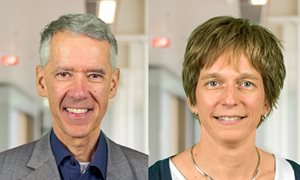
Jo Huiqing Zhou (Molecular Developmental Biology, Human Genetics, Theme Reconstructive and regenerative medicine) has received two multi-center grants, as the coordinator, for projects aiming at improving patient care and developing regeneration methods for cornea damage patients.
Cornea damage can lead to blindness and severely impair a patients' quality of life. The state-of-the-art treatment is a stem cell-based transplantation therapy that requires cornea stem cells from the patient's uninjured eye to regenerate the transparent cornea. For patients with two injured eyes, this treatment becomes impossible and blindness follows.
The ZonMw Open grant (750K euro), CorneaRegID, is a collaborative project between Maastricht University MERLN Institute, Maastricht UMC+ and Radboud University/Radboudumc. This project uses a data-driven approach to develop a novel transdifferentiation method by converting patient’s cell from other sources, such as skin or oral mucosa, to cornea stem cells for efficient corneal regeneration, thereby restoring vision and preventing blindness. For this, they will apply single-cell multi-omics approaches to identify the precise cell fates of cornea stem cells and cells of the skin and oral mucosa from the same donors. These cell fate maps will guide rational design of genetic modification-free transdifferentiation strategies suitable for transplantation.
Another grant (193K euro) funded by Velux Stiftung that focuses on improving eyesight research in low- and middle income countries is an international endeavor with collaboration of clinicians and scientists in Palestine, Israel and the Netherlands. Part of the project will focus on training of Palestinian ophthalmologists for improving phenotyping and diagnosis, identifying genetic conditions of cornea diseases and preparing for future transplantation. The other part of the project is to characterize and improve existing suboptimal transdifferentiation methods for future transplantation. This project focuses specifically on vision problems in Palestinian territories, but the technology will benefit cornea patients world-wide.
Related news items

FET-OPEN grant for Toin van Kuppevelt and Willeke Daamen
6 March 2020 A grant of 592 kEuro has been awarded to Toin van Kuppevelt and Willeke Daamen, theme Reconstructive and regenerative medicine, for a Horizon 2020 FET-OPEN project entitled “Heparin and heparan sulphate: from sequence determination to therapeutic strategies for Parkinson’s disease”. read more
Plugging the gap ZonMw/Health Holland grant
3 March 2020 RIMLS en RIHS researchers Willeke Daamen, Frank Vandenbussche, Joris van Drongelen, Toin van Kuppevelt and Janneke Grutters have been granted 1.3 million euro for the development and evaluation of a new technology to prevent premature rupture of fetal membranes (iPPROM). read more
H2020 Grant for Frank Walboomers and Ronald Bartels
23 May 2019 Frank Walboomers and Ronald Bartels, theme Reconstructive and regenerative medicine, have received a € 500,000 grant for research into graphene biomaterials from the Europan Union Horizon 2020 FET Open programme. read more
RIMLS awards festival Twelve winners
16 January 2019 In 5 categories RIMLS young researchers received an award and bonus during the New Year's drinks. See all photo's. read more
Prinses Beatrix Spierfonds grant for Rick Wansink and Frank Walboomers
23 July 2018 Rick Wansink, theme Nanomedicine, and Frank Walboomers, theme Reconstructive and regenerative medicine, have been awarded a 250.000 EUR grant of the Prinses Beatrix Spierfonds towards the study and elucidation of myotonic dystrophy, in a project entitled: Harmful RNA in myotonic dystrophy. read more
